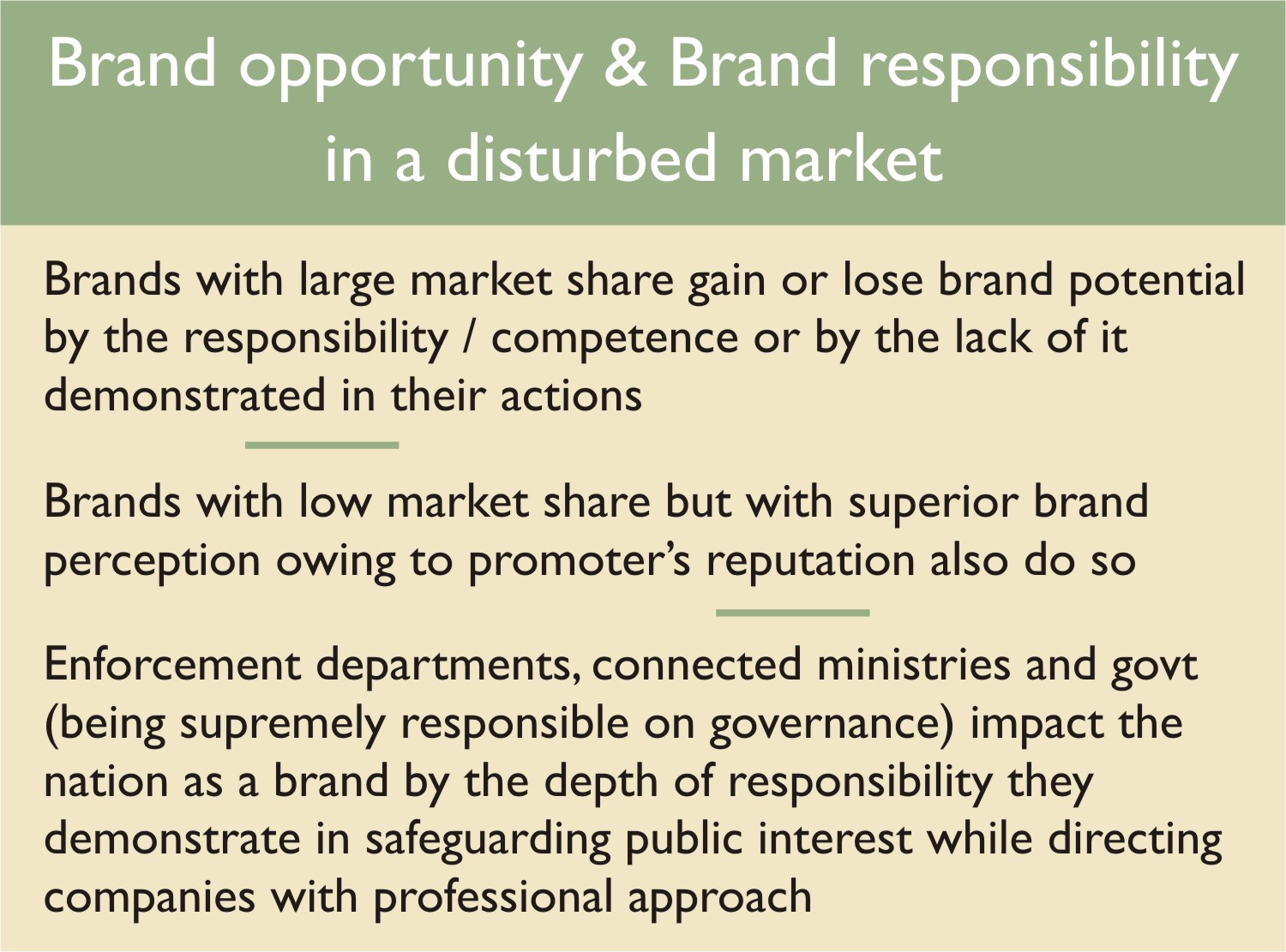Brand and branding opportunity and brand responsibility in a disturbed market
... branding, particularly negative ones, that happens from what is not said sticks to the brand thicker than that can be expected to happen from what is said. In the tricky processes of branding people's assumptions from what is implicit in what is not said is more potent to impact the brand than what they may believe from explicit announcements companies make..... that equation also provides potential branding opportunity from the crisis to the concerned ministries and the govt as a collective entity but loaded with brand responsibility of the highest order.
.........................................
How much of Maggi's sales has Yippee got? That question itself is quite pregnant with expectation of some big numbers considering the bulk that was all there up for grabs. The fact that ITC has never revealed it only reveals that the company is perhaps shy to talk of numbers that may not be worthy of doing so. But branding happens nonetheless, from that missing communication! Most marketing managers are either unaware or unmindful of the fact that branding, particularly negative ones, that happens from what is not said sticks to the brand thicker than that can be expected to happen from what is said. In the tricky processes of branding people's assumptions from what is implicit in what is not said is more potent to impact the brand than what they may believe from explicit announcements companies make.
Yippee had a huge market opportunity on hand with the Maggi packs going off the racks and for some good time, with the ban on its production and supplies as well and with that decision taken to the court for settlement. A brand that was challenging the leader with about 18% (unsubstantiated) share of the market ought to have garnered some good chunk of Rs.200 cr plus per month fast moving quick food that had to vanish all of a sudden. True, Yippee too did face the ban on sales in certain markets but was cleared without much fuss and to its advantage it never had to stop production and new supplies. That brings back the question; how much of Maggi's sales has Yippee got? But, as said, people's assumptions shape up the perceptions on brands, even with information, but more decidedly without information. Yippee seems to have failed to convert the providential market opportunity into a good branding opportunity by either failing to announce the increase in its sales off the Maggi crisis or, if it hasn't achieved that surge, by failing to collect the demand that was well, flowing towards it. The import is simple; this crisis ought to have resulted in some considerable surge in the sales of Yippee in the short term and if managed right should lead to some critical increase in its market share however little in the medium term notwithstanding the truth that Maggi would however reach its prime levels once back in the market, as easily as water would.
 If indeed Yippee has failed to pick up considerable easy sales off the market in the absence of Maggi, as can be assumed, the reasons can only be of fundamental nature. And Yippee's new communication campaign actually tells them off. It tells of two distinct reasons for the easy sales turning hard to fetch; one by the mistaken need (of the new campaign) and two, by what it (the campaign) says. Maggi's abrupt absence created a 'market opportunity' and Yippee being number two and being known to belong to a major corporate brand (ITC) could not have missed to make hay if it had worked with strategies in the market place with communication modules right there (POS) while continuing with its broad cast ads on work until the ban struck it and quickly resuming the ground efforts and the ads on clearance by the authorities. Yippee failed to convert that market opportunity which was a fine brand opportunity too for it into a branding opportunity by failing to turn in sales. Yippee should have focused all its efforts in garnering additional sales to be able to claim objectively, of having achieved that, for the comprehensive brand advantage it would have yielded.
If indeed Yippee has failed to pick up considerable easy sales off the market in the absence of Maggi, as can be assumed, the reasons can only be of fundamental nature. And Yippee's new communication campaign actually tells them off. It tells of two distinct reasons for the easy sales turning hard to fetch; one by the mistaken need (of the new campaign) and two, by what it (the campaign) says. Maggi's abrupt absence created a 'market opportunity' and Yippee being number two and being known to belong to a major corporate brand (ITC) could not have missed to make hay if it had worked with strategies in the market place with communication modules right there (POS) while continuing with its broad cast ads on work until the ban struck it and quickly resuming the ground efforts and the ads on clearance by the authorities. Yippee failed to convert that market opportunity which was a fine brand opportunity too for it into a branding opportunity by failing to turn in sales. Yippee should have focused all its efforts in garnering additional sales to be able to claim objectively, of having achieved that, for the comprehensive brand advantage it would have yielded.Reason two for sales turning harder or the possibility of it getting harder for Yippee in spite of no ban on it and no Maggi still is the inappropriate advertisement campaign in trying to use the crisis as branding opportunity upon apparently or as can be assumed failing to make good from the brand opportunity. Yippee's consumer education campaign lacks the potential to transform it as an evolving leader in the segment owing to the inappropriateness of the effort (the campaign) which quite ironically puts it right in the centre of the crisis, as being largely accused, leading to negative branding – a classic branding mistake. The clear brand opportunity for Yippee after being cleared by the tests was to leverage the field and communication efforts on that fact and go with full force in seeking the massive demand awaiting supply particularly that awaiting Maggi. The twin ad campaign, also deficiently executed, actually is potent to restrict sales for Yippee instead of promoting it. Worse, the widely reported threat, of possible repeat ban with a case, by FSSAI upon seeing more lead in Yippee yet again, tells the flaw in the campaign rather loudly.
In contrast, Maggi being the overwhelming market leader with over 60% share of the market and having evolved as a consumer driven brand since long, Nestle the MNC ought to have realized the responsibility it owes to the consumers for explaining the charges of the regulator and the company's explanation about it without jargon and essentially on the next steps it would take in convincingly settling issues demanding sincere attention. Neslle failed to heed to this brand responsibility and worse, displayed unexpected, unexpected of an MNC, sense of helplessness which has, without doubt, impacted brand Maggi negatively. In the crisis Maggi had no brand or branding opportunity but a huge brand responsibility and the associated risk of brand damage from deficient response, against that responsibility.
Following comments on the Maggi crisis extracted from the larger article 'How to manage a brand crisis? DON'T' published earlier in exchage4media.com explains the deficient action on the part of the company in responding to the crisis.
.....................................
Maggi, one among the top consumer driven brands swiftly slid into an unexpected crisis and developed rapidly to become the mother of all crises. Maggi rolled it all quickly in becoming a comprehensive case study on crisis management, more clearly about how to avoid it, by the gross inappropriateness of its decisions. It tells of the risk in the kind of uncharacteristic disdain of early departmental notices and in ignoring to invest in settling such specific observations convincingly. It also tells of the huge risk in the inertia on product development in spite of lingering inherent issues and worse of being so influenced by the overwhelming success of the product. Maggi proves by the helplessness it has demonstrated, of the uselessness of the brand power when not leveraged to its true characteristics and potential in settling challenging situations. Maggi in fact hastened the edicts of many state governments by not taking the next steps quickly in taking good control of the brewing crisis which eventually also led to massive loss which surely could have been drastically cut with some applied thinking about ensuring some salvage.
Maggi could have averted the crisis if it had respected the early notices to it on the concern of excessive 'lead' and MSG by dealing proactively with the front line govt staff. As a responsible MNC Nestle should have respected the work of the govt department and demonstrated professional attitude in assuring elaborate process check at all its production units in keeping the situation under control and could have communicated with the consumers as well, right then, on the concerns and in depth on the efforts positively charging the brand. In fact the company should have considered the notice as providence and should have initiated special quality assurance programs at its factories with out wasting time and simultaneously recalling suspect packs from the market on its own upon appropriate sample lab checks. What is the use of labeling production batches if it doesn't help in situations like this? Maggi brought up the crisis on its own by uncharacteristically talking of 'your checks' and 'our checks' and talking to the consumers through the social media asking them to continue to buy saying it is tested and proven safe - disregarding the opposing claims of the govt. It also tried to blame the supply chain for the excessive 'lead' and MSG again being uncharacteristically dismissive of its responsibility on the raw material checks.
Maggi invited the ban on its own by shirking away from its responsibilities and thus ceded the control of the situation to the govts. The second big mistake which is only consequential to not taking steps early to make selective recall through structured sample checks is to make the absolute recall from all stock points, on being compelled by the govt. The third and the biggest mistake is to stop the production and supplies. Instead of fighting the ban at the court the company should have reasoned hard with the govts on the needlessness of the ban on the production and supplies duly explaining the massive financial wreck it would unnecessarily cause and thus should have kept up the supply of Maggi, however lean and of course with stocks produced to the stipulations on the standards.
Nestle seems to have been thoroughly beset by the situation that it is hardly looking at options. The kind of speed with which decisions are being taken seems to be driving it all wrong. Burning up of about 320 cr of edible material which is disqualified only for standard violation, and not all of it, surely doesn't come across as the most fit option to deal with the banned stock, definitely not considering the pollution it would cause. Surely, the mountain of stock which is tested and approved fit for human consumption in certain other nations and also in some of the tests done here in India should be fit for feeding cattle and other animals, appropriately mixed or processed, for good and without any fear and very much so considering the much higher tolerance limits of large animals.
................................
The link to the full article: How to manage a Brand Crisis? Don't.
FSSAI the govt department which visibly stamps its authority in every branded food pack across categories incidentally had a highly potential branding opportunity in the Maggi case but the department, as evident from the conduct of the case, has quite apparently reduced itself in stature and on the command of respect, instead of considerably enhancing its brand power leveraging on the case. FSSAI proves a thing about brand awareness which the Maggi case generated for it aplenty; that brand awareness is bad if it arises from negative aspects since the damage would be greater, greater the awareness. Bad, good now and bad again kind of claims being made out from its tests do not help create a credible govt institution. Inconsistent claims, delayed action, arguably flawed and questionable decisions only make a strong case for FSSAI on the need to evolve itself as a well equipped, highly respected and strict department in the interest of general public. The gap looks wide.
 The good branding opportunity in the Maggi case for FSSAI was loaded with distinct brand responsibility as well and failure on the part of FSSAI to sense and act on that count makes it intrinsically deficient on the larger objectives. With the inconsistency in producing to the standards proven in a mature product set (noodles) the suspicion extends to innumerable sets of products and FSSAI should have infused greater sense of responsibility in the companies across the food segments by shifting the primary responsibility on to the companies for ensuring the health safety aspects of the products they make while simultaneously upgrading itself on the checks and routine protocol. FSSAI missed to enhance its respect quotient by issuing a highly mature directive to the food brands out there.
The good branding opportunity in the Maggi case for FSSAI was loaded with distinct brand responsibility as well and failure on the part of FSSAI to sense and act on that count makes it intrinsically deficient on the larger objectives. With the inconsistency in producing to the standards proven in a mature product set (noodles) the suspicion extends to innumerable sets of products and FSSAI should have infused greater sense of responsibility in the companies across the food segments by shifting the primary responsibility on to the companies for ensuring the health safety aspects of the products they make while simultaneously upgrading itself on the checks and routine protocol. FSSAI missed to enhance its respect quotient by issuing a highly mature directive to the food brands out there.FSSAI being a govt department and the govt's governance system on the public health assurance and the business environment include other departments too the brand image of FSSAI directly impacts the brand image of govt of India and that equation also provides potential branding opportunity from the crisis to the concerned ministries and the govt as a collective entity but loaded with brand responsibility of the highest order. Has the govt made good from the branding opportunity it had in the Maggi crisis? Has it enriched the perceptions about brand India as being uncompromising on public health safety while being professional in managing business environment?
The govt I believe has failed to provide proper directions exercising its supreme authority and responsibility early on which has led to the stalemate and that eventually shifting to the court. Govt could have avoided the case from turning unnecessarily complex by grouping the ministers of all the concerned ministries to talk in one voice and thus provide considered professional directions to the govt department (FSSAI) and also to Nestle and other companies. Maggi case suggests deficient approach from either side. Nestle being a reputed MNC failed to be the leader it is supposed to be in professionally working with the govt department on the next steps in fixing the bugs that inconsistently breached the standards in the products be it in their factories or in the affiliate labs of FSSAI. FSSAI's (govt's) approach and certain critical decisions on the case also seem to miss prudence. Also, Nestle's method of discarding the banned stock can hardly be the best option but the govt surprisingly seemed unconcerned about it. The class action suit is a classic branding move by the govt, right by the tone of it, but for branding the country as 'uncompromising and progressively professional' with that calls for matching professional environment of governance across the board. Overall deficient management of the issues deflates the punch from it.
16 September 2015
Copyright: Adve Srinivasa Bhat, India.











